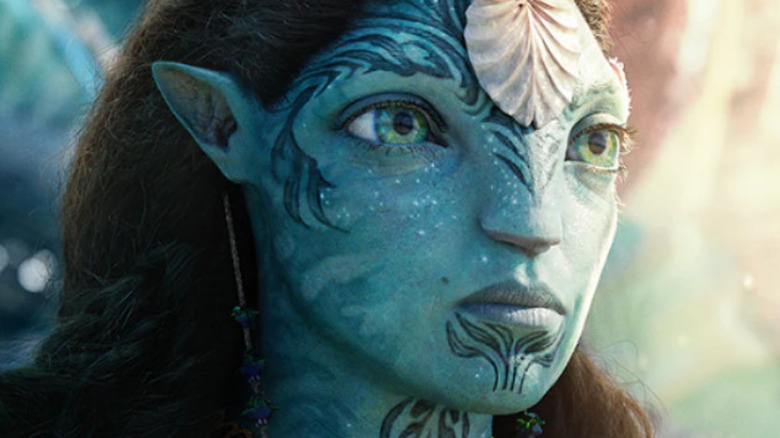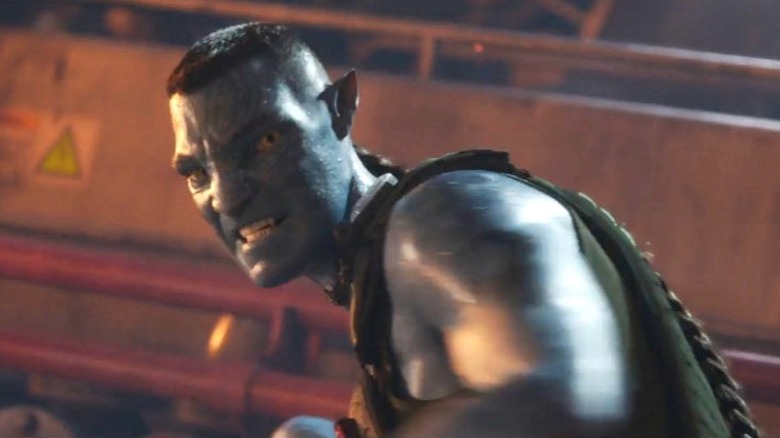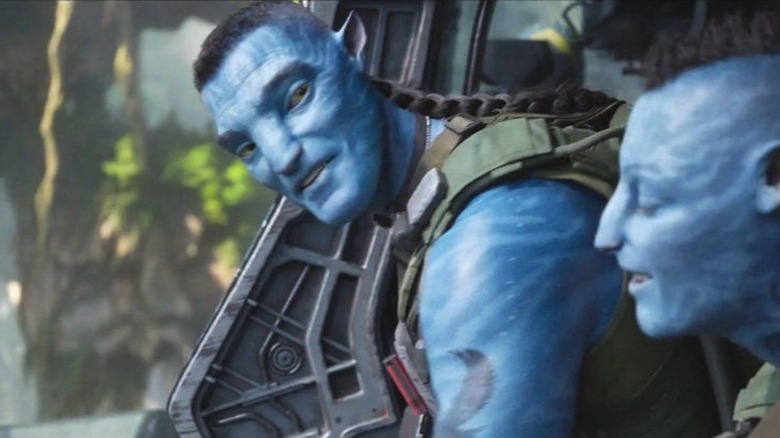Avatar: The Way Of Water Fans Thought The Recoms Could Have Used More Love
With science fiction being what it is, fans had every reason to expect that "Avatar: The Way of Water" would build on the science – both human technological and Pandoran natural – from the first movie. And it seems that, for the most part, expectations were met. Not only are viewers introduced to a whole new race of Na'vi with their own deep connections to their environment, the Metkayina, but also to an invading human force that's both more desperate and a bit more biotechnologically advanced.
Hence the recombinants. These are, as seen in the first movie, Na'vi avatars implanted with human consciousness. But the consciousness and memories of the recombinants come from dead humans, most notably the ruthless, ax-grinding Colonel Quaritch (Stephen Lang). Though Quaritch is, without a doubt, the Recom viewers see the most in "The Way of Water," plenty of others back him up, some similarly and previously killed by Na'vi during RDA's previous attempts to conquer them.
The savviness of this move isn't just in the fact that it allows Quaritch or other villains to return. It's also not just that it ups the stakes for the Na'vi, as they now have to face opponents with roughly the same physical abilities and adaptations to the environment. It opens the door to the internal conflicts of the Recoms themselves. Unfortunately, some fans seem to think this was one area in which "The Way of Water" could have used some work.
'Barely used'
Over at the r/Avatar subreddit, Jungle_Fighter claimed that they were dissatisfied with how little the Recoms were used in the movie. "I get that the movie had to introduce a lot of new characters and barely made it work with it's huge run time," they wrote. "But other than setting up Quaritch, the RECOM units was the most bland and unimportant group of soldiers of any action movie ever."
This seems to have been the gripe other fans had with the Recoms too. Though many found the whole concept to be a smart one, ultimately, they were underused and weren't given much room for character development. User JurassicGinger wrote that the recombinants were the concept that made them most look forward to the movie, but everything they did could have been accomplished by humans in the exo-suits from the first film. To this, the original poster replied that the Recoms only seemed to get killed by the good guys after their introduction — and in fairly uncreative ways.
Underutilized villains might not be as big of an issue as the plot holes in "Avatar: The Way of Water," but with this particular shortcoming, there is at least some room for James Cameron and company to course correct.
More character arcs
"Yeah, as much as I'm rooting for the Na'vi, I really really really hope the Recoms get more screentime and more importance in the next movies," wrote Payakan. "I love their bad*ss design."
There is a chance some fans will get their wish and see more Recom development in future films. In fact, despite how some may feel torn wanting more screentime for the recombinants, it doesn't necessarily contradict rooting for the Na'vi. On the surface, there is room for the recombinants to provide a consistent bad guy to the "Avatar" films, but it can also lead to interesting character arcs for the human consciousness inside them.
For example, Stephen Lang's Recom, Quaritch, is a character who could be getting set up to serve as an exception to the underdeveloped recombinants. He gets to meet his human son, Spider (Jack Champion), previously raised by Jake Sully (Sam Worthington) and Neytiri (Zoe Saldana) as a Na'vi. He also gets treated with a measure of human kindness when his son rescues him from drowning.
So, while some see future entries into the "Avatar" series as just more episodes in Quaritch's eternal battle against the Na'vi, others, including Stephen Lang himself, see the possibility of redemption for Quaritch in his Na'vi form that would not have been possible as a human. Which, in turn, opens the door for other Recoms to go through the same spiritual evolution.


